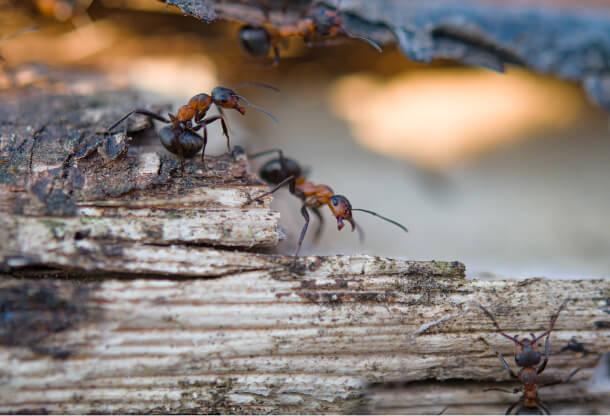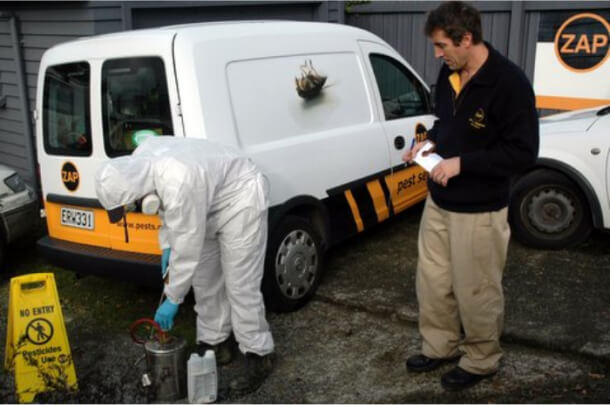White-footed ants in Wellington and Hutt … Argentine ants in Kāpiti … don’t they send you mad?
Well, You Are Not Alone… And Here’s A Thought…we Use Environmentally Friendly Transfer Products Which Are Only Available To Professionals.
What have ants walked over on the way to your kitchen?
Ants first appeared around 120 million years ago. They form highly organised colonies and operate as a unified entity, all working together to support their colony - hence the reason they are known as the number one pest in pest management. Did you know that some species of ants can also be a public health problem and can short circuit electrical components which can result in fire?
To spray or to bait?
When the nest feels threatened new queens head off in all directions to begin new nests thus multiplying the problem. Our qualified pest technician will work with you to determine the best treatment for the job. This may involve baiting, exterior spraying or a combination of both. Some clients prefer to have an exterior spray but stay spray free inside the house, the exterior spray has the added benefit of aiding in the control of other insects and spiders. Zap certainly continues to trial new products and keeps itself informed of new developments.
A non-repellent, ultimate ant control agent with the unique 'Transfer Effect' treats the ant problem without giving the ants any warning, giving them no time to react to it or avoid it. They continue with their regular routine, travelling to and from your home, walking right into it. Those ants pass it on to more ants, and soon it is passed on to the entire nest.
The professionalism of the initial inspection and resultant Integrated Pest Management plan is critical to any successful pest control treatment. Insecticide will probably be required to get the next ant inhabitants flushed out of the house and will also leave some residual to ensure no immediate re-infestation. There are several ways of doing this depending on environmental and architectural considerations. ZAP asks the question "Why?" and often we find unusual circumstances which support the infestation. Ants want shelter, food and water... there's nothing unusual about that!



Why treat outside when my problem is inside?
It may be recommended that an exterior ant treatment be applied. The ants inside your house may actually be living on the exterior, travelling back and forth foraging for food and water. The ant control is applied onto the exterior foundation walls to create a treated area of protection (not a barrier), as a barrier might end up trapping the ants inside your home. Our technicians will work with you to determine the location of the nest(s).

Qualified PMANZ Pest Technicians
'Do it yourself' ant control efforts can actually make things worse. Over-the-counter sprays, repellent or baiting can cause a phenomenon called 'budding', where ants are separated from the parent nest and queen and start their own colonies. We have access to a range of sprays and baits that are not available for sale to the general public. For the most effective and successful control of ants, we recommend that you use a professional licensed pest control technician.

We guarantee our treatment for a period of six months. Commercial pest control sprays will not last for ever. They are made to break down in the environment for safety reasons. If you should experience an ant re-infestation within six months of your treatment, we will come back and treat the area free of charge.
Pricing
Keep it simple $350 ... and if we have to return within 5 months ...no extra charge.
As well as effective ant control we offer a full range of pest control services, including spider control, termite control, flea control, cockroach control, rodent control, wasp control and all your Commercial and residential pest control needs in Lower Hutt, Upper Hutt, Porirua, Kapiti and throughout the Wellington region.
Common Ants in the Wellington Region

White Footed House Ant
The ants have pale legs and proportionally larger abdomens with no sting. These ants are troublesome because of their large colonies and constant foraging in kitchens, bathrooms and building exteriors.

Argentine Ant
A very aggressive species and combined with their large colonies can dominate other species that share their habitat. Once they have established in an area they are very aggressive and competitive. They do not have a sting, but they may bite.

Other
Other species of ants in the Wellington region include the Black House Ant, Argentine Ant, Coastal Brown Ant, Big Headed Ant, Southern Ant, Darwin's Ant and the Pavement Ant. Landcare Research has a great site with information about these species.
A few tips to help keep an ant free home

Trim vegetation away from the house

Empty waste baskets often and keep trash bags sealed

Clear or dispose of uneaten pet food

Use pest-proof containers

Wipe spills
ZAP pest control team

Neill Herdman
- Manager
- Master Registered Technician
- Approved Handler
- Past Pest Control Technician of the Year

Rodney Tregerthan
- Master Pest Control Technician
- Past Councillor Pest Management Assoc.NZ

Marvin George
- Pest control technician

Joel Browne
- Pest control technician
